Thanks to the OU dyslexia, caring for elderly relatives and anxiety were not barriers to Jasmine achieving a BSc (hons) in Sport, Fitness and Coaching.
Read Jasmine’s inspiring story here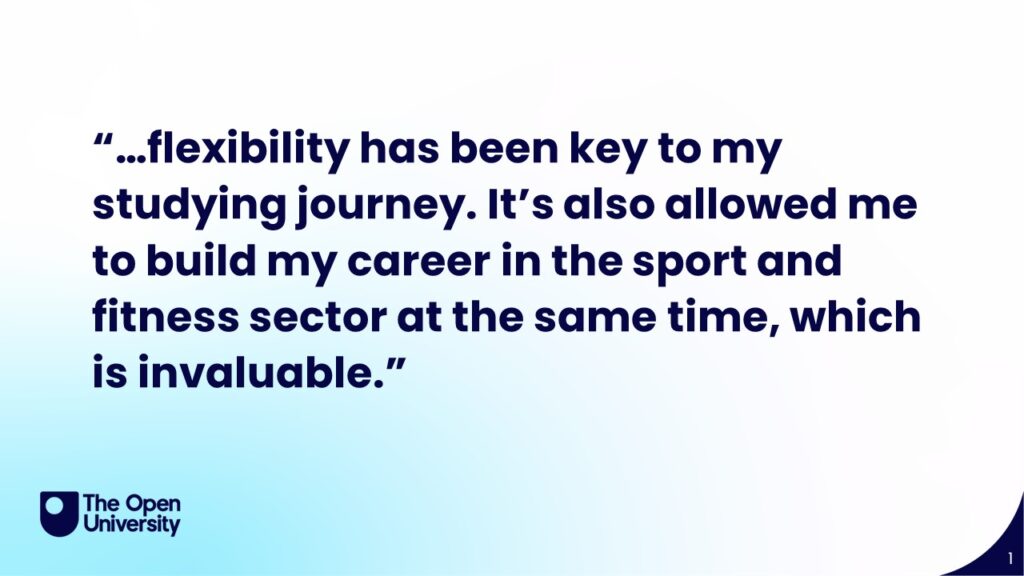

Thanks to the OU dyslexia, caring for elderly relatives and anxiety were not barriers to Jasmine achieving a BSc (hons) in Sport, Fitness and Coaching.
Read Jasmine’s inspiring story here
By Helen Owton
The Isle of man Tourist Trophy (TT) races have been running since 1907 and is notoriously known as one of the most dangerous in motorsports. The riders must navigate around a 37mile track around the Isle of Man with over 200 twists and corners, many of them blind, with ‘No Room for Error’ and top speeds of 200 mph on narrow country roads littered with street furniture – lampposts, concrete walls, houses, pubs, pavements, cliff edges, and no runoffs . The event has claimed over 150 lives which makes those competing in the event a death-defying act; riders as well as spectators all too aware of the risks.
Superstock Race 2 leader @peterhickman60 is through Kirk Michael on lap 2 🔥#TT2023 pic.twitter.com/jueaJ1NOUT
— Isle of Man TT Races (@ttracesofficial) June 9, 2023
What’s interesting about the TT is the wide range of personalities and ages; one of the highest achievers is 51yr old John McGuinness with 23 TT wins and is still one to beat. Racers participating in the IOM TT are living their lives on the edge and many wonder why they put their lives at such risk but maybe they’re not as ‘crazy’ as we think they are.
Race Face
Successful athletes develop effective pre-performance routines or ‘rituals’ which can be used to help individuals perform under pressure and concentrate on factors that are in their control (Openlearn).
You might see the riders turning on their “Race Face” which is a term referring to the mental posture that prepares and readies a motorcyclist for their race (Code, 2009: Rider’s Race Face | Motorcyclist (motorcyclistonline.com), (LONDON 2012 VIDEO).
“You may say a race face is a protective mask to prevent outside influences from entering into a rider’s world. Or you may say the mask serves to bridle a rider’s own force, keeping it ready to be unleashed and do his bidding at the appointed time. Either way, it is a valuable tool-another piece of protective apparel we don before heading on-track” (Code, 2009).
Attuning the senses
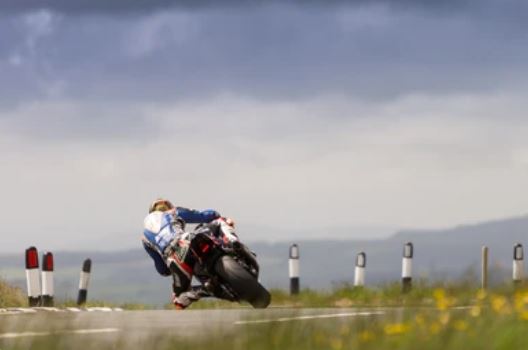
Extreme sports are often associated with thrill seekers with a ‘death wish’ or adrenaline junkies searching for their next thrill (Brymer and Schweitzer, 2013). However, these individuals can be highly trained with a deep knowledge of themselves, the activity, and the environment, who seek an experience that is life-enhancing and life-changing (Brymer and Schweitzer, 2013). Motorcycling, like other high-risk sports, requires a sharpening of senses, meticulous preparation, high work rates, swift recovery following setbacks and thriving in challenging situations (Crust et al., 2019). As Cole (2017) notes, it is important to set ourselves appropriate challenges and be attuned to one’s senses by anticipating, listening to engine sounds, being cool under pressure, being attuned to a constantly moving environment at speed, and positioning the body-motorcycle effectively round the corner; all run by one’s sub-conscious relying heavily on a deep knowledge of the TT circuit.
Muscle memory
Building that deep knowledge of the course takes time and practice; riders don’t immediately ride the course at that speed, and they have a whole practice week before every TT before the racing starts. This can help build up their ‘muscle memory’ which can also be referred to as motor memory, referring to one’s body’s memory to perform certain actions. There are two parts of the brain that help to learn sequences of actions and help to adjust errors in learning to improve one’s ability to perform those movements correctly. Also, a concept known as proprioception can be described as our sense of balance, position, and muscular tension, provided by receptors in muscles, joints, tendons, and the inner ear. These bodily (somatic) senses inform our perception of “inside” and “outside,” of inner and outer space meaning that senses act together to help give us our embodied perceptions of space (Paterson, 2009). Riders who participate in the TT have highly trained and attuned their bodies to that environment – the TT course – through practice, breathing, focus and visualisation. To enable them to optimise their potential and perform at their personal best, they engage in an optimal psychological state known as flow.
Risk and Reward
To induce flow, it is about balancing the level of skill with the challenge we are faced with (Nakamura et al., 2009); balancing risk versus reward and assessing whether a risk is worth taking as James Hiller discusses:
@ttracesofficial How do you calculate risk VS reward when you’re traveling at over 200mph? James Hillier is no stranger to pushing himself to get into the winners enclosure, and emotions run high when you aren’t in there. No Room for Error, showing Monday 22nd May: 🇬🇧 9pm ITV4 and ITVX 🌎 9pm TT+ #TTPlus #LoveTT #NRFE #NoRoomForError #Motorbike #motorbikesoftiktok #isleofman #motorsport
A TT rider faces intense fears, accepts that control of the future is not always possible and moves through these fears to participate fully in the action and make choices to reduce risk and enhance personal control (Brymer and Schweitzer, 2013; Crust et al., 2019).
Clutch States
Indeed, switching to what’s known as a ‘Clutch state’ which occurs under particular high-pressure conditions; it is similar to being “in the zone” but where there’s an important outcome. Clutch performances are comprised of focus, heightened awareness, and intense effort whereas flow states are viewed as effortless attention and automatic experiences (Swann and Goddard, 2020). Flow states are more aligned with “letting it happen” whereby confidence develops naturally whereas clutch states are associated with “making it happen” where there is a sudden increase in concentration and effort (Swann et al., 2015). To activate flow states or clutch states, there has been an association with certain goal types. For example, open goals such as “do your best” goals are more associated with inducing flow states, whereas specific goals with a fixed outcome such as “winning a race” and setting a task specific goal to “ride at 120mph round the next corner to overtake the next rider” to achieve that outcome is associated with ‘clutch’ performances. It is likely that there is a shifting or slippage in and out of the states and a blurring between and within the states and may link to how TT riders weigh up risk and reward.
Riding the TT where all the hard work has been done before the race, can induce a quietness of mind while you just breath and focus. While there is a thrill of speed and desire for a win, “One of the things that make motorcycling so great is because it never fails to give you a feeling of freedom and adventure” (Steve McQueen, 1930-1980).
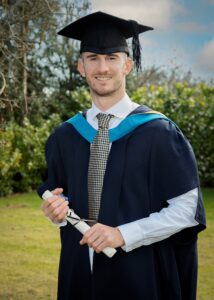 “Mum and dad trained as teachers, so I was always pushed in school. Even when football opportunities came, I was always pushed academically because the average length of a footballer’s career is seven years.
“Mum and dad trained as teachers, so I was always pushed in school. Even when football opportunities came, I was always pushed academically because the average length of a footballer’s career is seven years.
I’ve been lucky enough to be in it for seven years now. Hopefully, I’ll be able to play until I’m 35, but most players have to work so I always thought I need to plan for my future.”
After completing a BTEC in sport, Dominic’s older brother encouraged him to undertake a degree with the university.
“My brother had actually started his degree with the OU a couple of years before me. He said that the course was easy to understand and worked well around football.
We travel a lot, sometimes twice a week for away games, but even in a hotel room you can do your work. I like the fact that I had the flexibility to get on and do my work on flights or at different clubs but keep up with my workload.
My brother’s degree was partly funded by the Professional Footballers’ Association (PFA). They provide financial support to young players which is brilliant – it pushes players to do something in education. When it came time for me to do my degree, university fees had gone up but the PFA provided a bursary, which made it a lot more affordable as a young player.”
At first Dominic found the course challenging but found his feet in his final year and really excelled.
“Initially, I didn’t engage with my tutors or get involved in the student community, so I struggled for the first half of a six-year course. In one assignment I received 14 out 100 which made me think, I need to understand where I’m going wrong.
I started to engage with my tutors and other students, it made the experience more enjoyable. In my last year, I finally understood how to structure my essays and assignments – the penny dropped. I was averaging 70 per cent in my results.”
Dominic didn’t experience the traditional graduation ceremony as he completed his degree during lockdown, but it was still a special moment for him and his loved ones.
“I organised a small celebration at home. I hired a photographer to take photos of me in my robes. It was a special moment – my girlfriend, my dog, and my mum and dad were there to help me celebrate.
All my hard work has paid off, which was a big moment for not only me but also for my parents. I would have loved to go to graduation, but we’ve all missed out on something this year, and I was just pleased to get my degree.”
Now with a degree under his belt Dominic is hopeful for the future and plans to go into business after football.
“Football is my passion – I still have dreams of playing in the Premiership. But with my degree, I hope that in time I can set up a business, maybe something to do with football, so that I have a career long after my days on the pitch.”
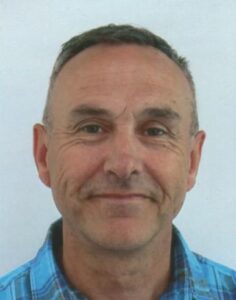 When I left school in Scotland back in the early ‘80s I went to university to study science but after a year I decided it wasn’t for me. I was a real disappointment to my folks – the first of my generation to go to university and the first one to drop out!
When I left school in Scotland back in the early ‘80s I went to university to study science but after a year I decided it wasn’t for me. I was a real disappointment to my folks – the first of my generation to go to university and the first one to drop out!
After doing menial jobs for a couple of years I decided to go back to college and completed an HND in business studies, with a view to improving my prospects. However, unemployment was high back then, jobs were few and far between and it looked like I was going to have to relocate if I wanted to work, but that wasn’t acceptable to me.
Since I was a kid in the scouts, I’d always been into hillwalking, canoeing and kayaking, all these things you can do outdoors. It’s always been my thing. I decided to do some voluntary work at outdoor centres to become qualified as an outdoor instructor, but political changes at that time closed a lot of outdoor education jobs. I didn’t see a future in that area, so a complete change of career plan followed, and I joined the police.
After a couple of years as a cop I decided to improve my higher education and transferred the credit from my HND to the OU, to do a Social Policy Diploma. I wanted to see what the academics made of the social problems I was confronted with on a daily basis, and I felt a degree would help with promotion. I got support from the police with funding, which helped quite a bit, and studied around my shifts.
After achieving the Diploma in Higher Education, I decided to study further courses in sociology and criminology, and went on to achieve a BSc (Hons) Open degree with the OU. Studying those areas helped me in my police career. I gained a wider knowledge and perspective on the things I was dealing with, because social problems and issues around social welfare are the main thing you’re dealing with as a uniformed cop. The studies gave me more confidence, especially when I moved from dealing with people at street level to being a detective sergeant in the economic crime unit. There, I was often investigating lawyers and bankers committing fraud, you might say a more educated form of criminal.
All the time I was in the police force I kept up my interest in the outdoors and I decided that when I retired from the force I was going to work as a freelance outdoor instructor. You retire from the police at a relatively young age with a decent pension, so the freelancing world is good to work in if you don’t need to depend on finding a regular full-time income. During my last few years in the force I spent a lot of my spare time gaining outdoor sports coaching qualifications and when I did retire I picked up work as a freelancer, mainly at outdoor centres. That kept me busy in summer, but I was conscious that during the winter I wasn’t going to get as much work, so I thought I’d go back to study again. That’s what led me to the course I’m studying now, which is the BSc (Hons) Sport, Fitness & Coaching. I wanted to study the theoretical background of sport, fitness and coaching to support me in my day-to-day work, I suppose similar to what I did when I was in the police. I’m funding my studies from what I make as an outdoor instructor.
I really enjoy the Sports degree because it fits in perfectly with what I do in my current occupation as a freelance outdoor instructor. The studies make me think more about my actual, practical coaching. There’s lots of little nuggets of information I’ve learned. Coaching has always fascinated me, so I’ve studied coaching theory before, but this course is filling in some of the blank areas. You get that satisfying kind of, ‘Oh that’s why!’ realisation when you study and discover the reasons why certain approaches or methods work better than others.
One major thing I’ve learned is that there’s a big difference between a coach and an instructor. For example, it’s very important from a coaching point of view that, especially when you’re going to be working with someone over a period of time, you’re not just providing answers to the questions that they are seeking but leading them to find out the answers for themselves. As a coach, you should be helping them to think, rather than saying, ‘This is what you do. Here’s the answer.’ That, according to coaching theory, is what helps your pupil retain what they’ve learned, rather than them just doing what you tell them to do and then forgetting about it.
The biggest challenge of studying comes whenever I have an assignment deadline! That’s when you say to yourself, ‘Why am I doing this?!’ I just try and avoid the procrastination and get on with it but it’s very easy to find other things to distract you.
This is my second Open University degree, so I know I can do it, it’s just a matter of working away at it. But I think the inspiration for my first OU course was my Mum. When I was about 14, my Mum, who left school with no qualifications, decided to go back to college, earning higher education qualifications and ended up working as a college lecturer.
The main difference between the OU back in the ‘90s and the OU today is not having to set your video recorder for 2am to record a programme you need to see to study your module! Everything’s available online now, which is a great improvement, as it’s easier to access, although the quality of the course materials was just as good then as it is now.
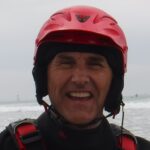 I now have my own little business: Sandy Johnston Coaching. I coach people in kayaking, canoeing and watersports, mostly. It’s a nice way to work, working for myself and freelancing with other organisations, such as the scouts or different outdoor centres. It’s really enjoyable and I’m getting paid for something I love doing.
I now have my own little business: Sandy Johnston Coaching. I coach people in kayaking, canoeing and watersports, mostly. It’s a nice way to work, working for myself and freelancing with other organisations, such as the scouts or different outdoor centres. It’s really enjoyable and I’m getting paid for something I love doing.
My plans for the future are to expand my own coaching business and to work with long-term students to help them to develop. I’m going to continue my studies in coaching. I’m a performance coach in Whitewater kayaking and I would quite like to do the next step up – British Canoeing Coaching Level 4, which is a postgrad diploma – because I want to improve my standing as a coach. I’ve got another ten to fifteen years of my working life left so it would be nice to work at the very top end of coaching.
My advice to anyone thinking of doing an OU course? Just do it!
By Simon Rea
Firstly, welcome to The Open University and secondly, thank you for choosing to study on the sport, fitness, and coaching degree. We have a range of fantastic courses for you to study to support you towards achieving a fulfilling career working in sport or fitness. During this turbulent year of 2020 it seems to me that sport has become even more important. Research has shown that fit and healthy people are less affected by Covid-19 and as a result we have been encouraged to take daily exercise outdoors, and the fitness industry has seen a surge in people engaging with online fitness platforms. During this time I felt lost when there was no live sport for three months and like many others have binged on sport since its return.
As a sport and fitness student it is likely that you feel as passionate about sport and fitness as I do and in this blog I want to encourage you to make the most of your undergraduate studies. I want you to get the best value for the personal and financial investment you have undertaken and the sacrifices you may have to make. While sport and fitness offer a range of exciting careers and the opportunity to work with interesting and inspiring people the job market is highly competitive. Sport science, studies and sports coaching courses are now the most popular degree course in the UK with around 15,000 graduates a year leaving around 138 universities that offer these degrees. Indeed there are almost 1500 students enrolling, along with yourself, on year 1 sport and fitness modules at The Open University.
Therefore, it is advantageous to get ahead of this competition and give yourself as great an advantage for the future as you can. We appreciate that you have busy lives and finding time to study may not always be easy as you juggle work, family, and social commitments. These conflicting priorities can lead to students being tactical in how they study. To encourage you to make the absolute most of your time spent studying with us and to maximise your learning and enjoyment I will offer three pieces of advice for you to consider whilst studying.
In your module materials you will find a range of resources. There are readings, audio and video clips to watch and listen to, websites to visit and activities to complete. We will also offer additional resources at certain points so that you can find out more. We would encourage you to learn as much as you can about the subjects you are studying by reading widely and visiting websites related to the subject. Social media offers a plethora of opportunities and you can follow experts and influencers that you are interested in. For example, Twitter enables you to follow coaches, personal trainers, and academics in sport.
Before you start your module you will be assigned a tutor and a tutor group. Your tutor will tell you how to contact them and you will be given information about the schedule of tutorials. You will also find out about your online tutor group forum where you can meet and interact with other students.
This engagement with other people is crucial to your understanding of the module materials as some of the most valuable learning is described as social learning where you learn from other people. Discussing and debating can give you different perspectives on a subject and hearing other student’s experiences can broaden your own understanding. This kind of learning will happen during tutorials and during collaborative tutor group forum activities. During the learning process it is vital that you do not accept all content without questioning it. Ask yourself – ‘where did this knowledge come from?’ ‘Are there other ways of doing things?’
Discussing, debating, and questioning will improve your understanding of a subject but it will also develop critical skills that are so crucial in higher education and valued by employers.
While knowledge is exciting to have it is most valuable when you can actually apply it. This may be applying it to your own working practice or to help yourself and other people. So, you must always find opportunities to apply your knowledge. This may be reflecting on past experiences and gaining new perspectives on them or thinking about how you can use the knowledge now or in the future.
I have always found that when people know I am involved in sport science they have questions about their training or their diet. Let people know you are studying sport and fitness and talk to them about it and express your views if the opportunity arises. Sharing your knowledge with other people is a great way to increase your own knowledge and understanding of a subject.
Final thoughts
As I said earlier we appreciate that studying is just one factor amongst many competing for your time and it may be difficult to implement all three pieces of advice consistently. However, if you bear them in mind during your studies you will improve your chances of success both during your studies and in the future.
We hope you have a wonderful experience during your time studying sport, fitness, and coaching at The Open University.
Simon Rea is a Lecturer on the sport and fitness award at The Open University and the author of the books Careers in Sports Science (2019) and Sports Science – a complete introduction (2015).
By Rachael Pugh, Hannah Lake, Sula Douglas, Daniel Breacher and Ryan Williams (E119 19J Students)
This blog was written as part of a collaborative team work task by students studying E119. They had to select a topic and then decide on what roles each person would perform in the team, such as researcher, writer, editor and leader. This blog was chosen as one of the best blogs from around 80 blogs that were produced.
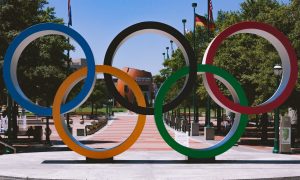 The participation of transgender athletes in Olympic competition raises issues not just about sport regulations but of society’s overall attitudes to gender. The whole subject of transgender people can still be divisive and misunderstood in our society. Many people have limited or no contact with transgender people, this can cloud their judgement leading to fear and rumours. From anger over which bathroom people can use, to which clothing a child gets to wear, it is a contentious subject. Transgender participation in sport is a complex issue and may well become more so in the future with the rise of gender neutrality. Sport has long had issues of discrimination and many sports’ governing bodies are working hard to provide fairness and reduce discrimination. Sport in general and the International Olympic Committee in particular, needs to find a way to make participation fair for everyone; transgender athletes as well as cisgender athletes.
The participation of transgender athletes in Olympic competition raises issues not just about sport regulations but of society’s overall attitudes to gender. The whole subject of transgender people can still be divisive and misunderstood in our society. Many people have limited or no contact with transgender people, this can cloud their judgement leading to fear and rumours. From anger over which bathroom people can use, to which clothing a child gets to wear, it is a contentious subject. Transgender participation in sport is a complex issue and may well become more so in the future with the rise of gender neutrality. Sport has long had issues of discrimination and many sports’ governing bodies are working hard to provide fairness and reduce discrimination. Sport in general and the International Olympic Committee in particular, needs to find a way to make participation fair for everyone; transgender athletes as well as cisgender athletes.
One of the main points involved in this discussion is providing equality and equal opportunity for everyone. By excluding transgender athletes from participating in high level events such as the Olympics, we are not promoting equal opportunity. When looking at transgender participation not only high-level athletes need to be considered. Young people often look to athletes as role models. One role model is Laurel Hubbard, a transgender weightlifter, who transitioned from male to female. After her transition, she went on to successfully compete in the commonwealth games, achieving a record breaking performance in the women’s weightlifting category (Brown, 2018). Kristi Miller, a transgender athlete and activist stated, “Hopefully Laurel’s given some hope to some young trans kid sitting around the world” (Davidson, 2018). Having visible transgender role models for young transgender people is very important – it gives the young people someone to look up to and as a consequence, helps to promote participation in sport for everyone.
However, Laurel’s wins and participation have created some controversy amongst other female competitors and their coaches. Jerry Wallwork, Head Coach for the Samoa weightlifting team said, “A man is a man and a woman is a woman and I know a lot of changes have gone through, but in the past Laurel Hubbard used to be a male champion weightlifter” (Davidson, 2018). Wallwork’s comments illustrate the issue of how gender is viewed in society and how often transgender people are not accepted. If more transgender athletes were allowed to compete – this would result in society being exposed to more transgender people in the media. This exposure would allow them to become more accepted and allow young transgender people to be inspired and participate in sport.
Conversely, there is the issue of fairness for female athletes – how being transgender may give athletes an advantage over other female competitors particularly in the case of Laurel Hubbard who used to compete as a male weightlifter. “The athletic advantage that Hubbard herself gleaned suggests as much. As a man, the Kiwi scarcely registered in the sport at international level. Today, as a woman, she is a world-beater,” (Brown, 2018).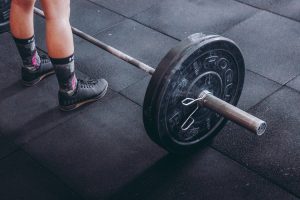
Currently athletes who have transitioned from female to male can compete without restriction (BBC, 2019). However, for an athlete who has transitioned from male to female it is much more difficult. This is mainly because officials are trying to make it fair for all the female cisgender competitors and there are many physiological differences between males and females. These physiological differences are why we have separate male and female categories in sport in the first place. On average women have two thirds the strength of men, have smaller bones and a lower oxygen carrying capacity (Latham, 2018). The benefits of these physiological differences mean that men are usually stronger, faster and bigger. Not all of these physiological differences can be managed in the medical transitional process, therefore some of the advantages of being born male, remain in the transgender athlete.
When examining the difference between male and female bodies the issue of testosterone is often discussed. In order for a transgender athlete to compete as a female the IOC guideline from 2015 states “the total testosterone level in serum must be kept below ten nanomoles per litre for at least 12 months” (Ingle, 2019) however this is controversial as “women’s testosterone levels tend to range between 0.12 and 1.79 nmol/l, while men’s are typically between 7.7 to 29.4 nmol/l.” (Ingle, 2019). This means that transgender athletes, even those following the IOC Guidelines, could have testosterone levels up to 5 times higher than most female athletes. Higher levels of testosterone increase muscle mass and reduce fatigue both of which are important when competing at a high level of sport (Pietrangelo, 2016).
Many high profile athletes feel passionately about the potential damage to female sport when transgender athletes compete. Sharon Davies, the internationally renowned and celebrated swimmer, said ““I believe there is a fundamental difference between the binary sex you are born with and the gender you may identify as. To protect women’s sport, those with a male sex advantage should not be able to compete in women’s sport.” (Ingle, 2020). These higher levels of testosterone and other physiological advantages mean that cisgender women could have a disadvantage when competing against transgender women.
To conclude, on the one hand society now recognises peoples’ right to change gender however it is very difficult to create a level playing field in some areas and competitive sport is very much one of these. The question of how transgender people compete in Olympic events raises issues of equality of opportunity and fairness of competition. The sports’ governing bodies are attempting to address the issues of physical fairness through regulation but this is not a straight forward process. Scientific development may be ahead of society’s ability to regulate for its consequences in this area. Given the diversity of genders and people in our society this may be an area for adapting and compromising in 2020 and beyond.
REFERENCES
Davidson, H (2018) Transgender weightlifter Laurel Hubbard’s eligibility under scrutiny (Online) The Guardian. Available at https://www.theguardian.com/sport/2018/apr/09/transgender-weightlifter-laurel-hubbards-eligibility-under-scrutiny (Accessed 28 January 2020)
Latham, A (2018). Physiological difference between male and female athletes. (online). (last updated 28 June 2018). Available at: https://work.chron.com/physiological-differences-between-male-female-athletes-20627.html (Accessed 27 January 2020)
Pietrangelo, A (2016) How testosterone benefits your body (Online) Healthline. Available at https://www.healthline.com/health/benefits-testosterone (Accessed 29 January 2020)
Brown, O (2018). Transgender weightlifter under strain: Laurel Hubbard’s exit may be blessing in disguise as eligibility debate rages (Online) The Telegraph. Available at https://www.telegraph.co.uk/weightlifting/2018/04/09/transgender-weightlifter-strain-laurel-hubbards-exit-may-blessing/ (Accessed 29 Jan, 2020)
Ingle, S. (2019). IOC delays new transgender guidelines after scientists fail to agree. [online] The Guardian. Available at: https://www.theguardian.com/sport/2019/sep/24/ioc-delays-new-transgender-guidelines-2020-olympics [Accessed 28 January 2020].
By Lucy Kafourous-Smith, Daniel Morrison, Sam Hughes, Kyle Murray, Sean Gilfillan, Rebecca Murphy and Sam Hughes-Finn (E119 19J Students)
This blog was written as part of a collaborative team work task by students studying E119. They had to select a topic and then decide on what roles each person would perform in the team, such as researcher, writer, editor and leader. This blog was chosen as one of the best blogs from around 80 blogs that were produced.
Vision 2030: Saudi Arabia’s ambitious, pervasive overhaul of its economy and society put into motion since 2016. It paints a picture of a nation keen to refurbish its global image and integrate itself with the western world – no small feat considering its historical rejection of western culture, and strict implementation of Islamic laws and values. Aggressive investment into sport has particularly attracted mass media interest as the nation strikes deals for world-class events, such as the boxing rematch of Anthony Joshua and Andy Ruiz Jr held in December 2019, the European Tour for golf, as well as F1 gearing up for Saudi participation in the coming years. The speed at which entirely new venues are being constructed for these events, also reflects the extent of this ambition. Construction of the Diriyah arena for Joshua v Ruiz began a mere two months before the fight.
However, the kingdom’s political track record has roused many sceptics and caused a controversial backlash. Sporting organisations and athletes are facing waves of scrutiny, often being accused of supporting the ambitions of a nation that has an extensive list of human rights abuses under its belt. Human rights group Amnesty International (2019) describes such acts including – but not limited to – repressing government critics, and human rights campaigners with prison sentences; extensive use of the death penalty and state-imposed torture for conduct that isn’t recognised as crime under international law; and continued discrimination against women, LGBTI groups, and the Shi’a Muslim minority. Not to forget the widely reported murder of Arabian journalist Jamal Kashoggi in Istanbul back in 2018, for which the Saudi government were held responsible (Aljazerra News, 2019). Amnesty’s critique resulted in them coining the term ‘sportswashing’ to describe the perceived attempt to use high-profile sport to furnish over these offences. Despite that, purely focusing on historical events would limit the chance of successful future sporting events, and any positive cultural change, however uncomfortable the decision may be.
Prior to his fight, Anthony Joshua was interviewed on the decision to fight in Saudi Arabia, where he simply stated: “My only focus is just the boxing”, but incited scrutiny by commenting that “the country is trying to do a good job politically”(BBC 2019). It would seem he desires to stay politically neutral and is happy to fight and promote his sport wherever it may take him. However, when asked about the possibility of ‘sportswashing’, he replied: “…I would be bothered” (BBC, 2019). He also admits that the decision to fight in Saudi Arabia was a collective one taken by his organizers, as well as his promotor, Eddie Hearn, admitting that the choice to fight there was primarily motivated by the sizable financial offer, leading many to believe that he is being manipulated by money.
Conversely, golfing superstars Rory McIlroy and Tiger Woods opted out of participating in the Saudi-hosted European Tour, but state that their decision was not politically influenced. Despite this, McIlroy commented that: “…there’s a morality to it as well” (The Guardian, 2019) but makes the interesting point that there are other countries with political stains where these events are held. Woods notably defended golf’s participation in Saudi Arabia by saying: “I understand the politics behind it but also golf can help heal a lot of that too” (Gray, 2019). Interestingly, Woods turned down a $3m appearance fee offer (Gray, 2019), and McIlroy refused to deny that a similar offer of $2.5m was made to him (The Guardian, 2019), causing many to raise sceptical eyebrows at the copious financial offers in place to persuade key players to simply participate.
In football, the Spanish Super Cup has gone as far as significantly changing its format for the foreseeable future as it holds its next innings in Saudi Arabia. Moving from a 2-team to a 4-team line-up and holding the event in January instead of the pre-season Summer, caused a stir. Yet again, the main motivation for such a shift is believed to be the amount of money flowing. As stated by the BBC (2020) the Spanish media reported a yearly worth of 40m euros. Despite Barcelona benefitting from a 6m-euro cash-in, the team’s coach, Ernesto Valverde, expressed discontent as he preferred the old format from a sporting point of view, and affirms that the 6m offer was the deciding factor for the change (BBC, 2020). However, this deal came with the condition that women were allowed to attend the event – an intriguing outcome from a country that has typically segregated women. Similarly, the Italian Suppercoppa showed positive developments, by allowing women to enter the stadium, albeit form the family enclosures only (Burnton, 2019). But this move signalled the start of culture change, which would allow women the same rights as men, even if it is for a 90-minute game of football.
Formula 1 also has its sights set with a $50m per year Grand Prix deal on the table which could kick off as early as 2021, with a purpose-built circuit being constructed for 2022 (Benson, 2020). Mcevoy (2020) identifies The Grand Prix event is no stranger to countries with unfavourable human rights records as it has previously been hosted by the likes of Abu Dhabi, Russia, and China, but it attempts to deflect criticism by insisting that it is politically neutral. Part of the “vision 2030” plan includes Saudi Arabia holding the desert round of the new Extreme E championships -electric off-road SUV (Auto sport 2019). Criticism to holding it here is defended by its founder, Alejandro Agag, who supports the positive changes occurring in Saudi Arabia, and how it can help strengthen the sporting pillar of vison 2030.
With a variety of perspectives to consider, we may justifiably ponder if the Saudi government is heart-felt in redeeming itself from past mistakes, or if they are leveraging their great wealth to simply ‘gloss over’ its most fundamental flaws. Regarding the athletes themselves, do we judge them as aiding a possibly dishonest regime change, or do we praise them for attempting to bring positivity, and culture to a troubled country?
Aljazerra News (2019) ‘Khashoggi’s murder: one year on, here’s what we know’, Aljazerra, 1 October [Blog]. Available at https://www.aljazeera.com/news/2019/09/year-jamal-khashoggi-murder-190930100740798.html (Accessed 6 January 2020).
Amnesty International (2018) Saudi Arabia 2018 [online]. Available at https://www.amnesty.org/en/countries/middle-east-and-north-africa/saudi-arabia/report-saudi-arabia/ (Accessed on 6 January 2020).
BBC (2019) ‘Joshua v Ruiz II: Anthony Joshua responds to ‘sportswashing” Saudi human rights claims’, BBC, 5 December [Blog]. Available at https://www.bbc.co.uk/sport/boxing/50633807 (Accessed 7 January 2020).
BBC (2019) ‘Joshua v Ruiz II: 15,000-seat Diriyah Arena venue revealed’, BBC, 26 November [Blog]. Available at https://www.bbc.co.uk/sport/boxing/50557116 (Accessed 8 January 2020).
BBC (2019) ‘Spanish Super Cup – who, why and where?’, BBC, 8 January, [Blog]. Available at https://www.bbc.co.uk/sport/football/51013150 (Accessed 8 January 2020).
BBC (2019) ‘Spanish Super Cup: We are in Saudi Arabia because of money, says Barcelona boss Valverde’, BBC 8 January, [Blog]. Available at https://www.bbc.co.uk/sport/football/51042079 (Accessed 8 January 2020).
Benson, A. (2020) BBC [online]. Available at https://www.bbc.co.uk/sport/formula1/51137520 (Accessed 17 January 2020).
Burnton, S. (2019) The Guardian [online]. Available at https://www.theguardian.com/football/2019/jan/13/supercoppa-controversy-rages-saudi-arabia-treatment-women-jamal-khashoggi (Accessed 16 January 2020).
Grey, W. (2019) Golf channel [online]. Available at https://www.golfchannel.com/news/report-tiger-woods-turned-down-appearance-fee-saudi-arabia-event (Accessed 7 January 2020).
Kalinauckas, A. (2019) Auto Sport [online]. Available at https://www.autosport.com/fe/news/146900/saudi-arabia-to-host-extreme-e-desert-round (Accessed 28 January 2020).
Mcevoy, J. (2020) Daily Mail [online]. Available at https://www.dailymail.co.uk/sport/sportsnews/article-7882935/F1-poised-join-Saudi-sportswash-50m-year-deal-table.html (Accessed 16 January 2020).
Ordonez, V. (2019) ABC News [online]. Available at https://abcnews.go.com/International/clash-dunes-saudi-arabia-fights-overcome-criticism-controversy/story?id=67562255 (Accessed 28 December 2019).
PA Media (2019) The Guardian [online]. Available at https://www.theguardian.com/sport/2019/dec/10/rory-mcilroy-says-morality-played-part-turning-down-saudi-arabia-event-golf (Accessed 3 January 2020).
Saudi Gazette (2014) Al Arabia[online]. Available at http://english.alarabiya.net/en/perspective/features/2016/04/26/Full-text-of-Saudi-Arabia-s-Vision-2030.html (Accessed 8 January 2020).
By Simon Rea
Firstly, welcome to The Open University and I hope you enjoy your studies with us. You have started on an exciting path of study and hopefully a rewarding future career. There are great opportunities to work in grass roots sport, performance sport, health and fitness, coaching and teaching and exercise science. However, sport and fitness courses are now one of the most popular undergraduate courses studied at university. There are now over 80 higher education institutions offering degrees and around 15,000 students graduating every year. While there are good jobs available the competition is very strong even before you consider the number of students studying for Masters degrees and PhDs.
Employers recognise that Open University students have to show special skills to organise their busy lives, hold down a job and plan their studies. However, that may not be enough to make you stand out from the crowd when it comes to applying for jobs. You need to be competitive in the job market and this may involve you showing skills beyond those of achieving a degree.
Between 2017 and 2019 I interviewed over 20 people currently working in sport and fitness occupations to find out what skills and qualities are needed to work effectively in sport and fitness roles. Many of the respondents explained how sport and fitness environments can be complex and challenging. This is because they involve people but also people who are goal directed and often high achievers. Sports environments tend to be highly pressurised and constantly changing and you need particular skills to navigate through them. You need to have skills to work with people who may be your colleagues or your clients. Being able to develop and maintain relationships is central to your success in sport and fitness.
In this blog I offer three tips that will help to improve your employability and effectiveness when you are in the workplace.
1. Get as much experience as you can from wherever you can.
Everyone I interviewed stressed the importance of gaining experience. All experience of working with people is valuable because you can then learn about your communication, listening and other personal skills. However, the main reason is that it is the best way to develop skills that are needed in the workplace. The only way to show an employer that you can do a job is by showing them that you have done it before. If you have spent the previous three or more years studying, then you can show that you have the knowledge but there is no evidence that you will be able to apply it in real life situations.
Experience can come from work experience placements or internships or you can volunteer at local sports clubs and offer to help. This may involve setting up equipment, helping with timings or preparing and handling out drinks. Once you are in a sports environment there may be opportunities to share your knowledge with coaches and athletes.
In addition to gaining experience you also need to be able to learn from your experiences by reflecting or reviewing them. This can be done by asking yourself reflective questions or discussing your performance with other people. This reflective approach is covered in module E119.
2. Gain as much knowledge as you can about as many disciplines in sports science as possible.
While I said that knowledge alone may not get you a job it is still incredibly important when working in sport and fitness. The study of sport is multidisciplinary in that it involves anatomy and physiology, exercise physiology, sport psychology, biomechanics, nutrition as well as research skills. During your studies with us you will cover all these disciplines and also learn about coaching and instructional skills. However, due to the wide scope of your studies you may not cover everything in detail. Firstly, I would encourage you to engage with all the module resources and further reading where it is suggested but also read widely in relevant textbooks, journal articles and respected websites. Listen to as many sports related podcasts and watch programmes that can contribute to your learning.
By taking in as much knowledge as you can you will start to learn about the range of occupations in sport and fitness and the knowledge that different specialists will have. In performance sport the support team may be made up of exercise physiologists, sport psychologists, performance analysts, strength and conditioning coaches, nutritionists and it is important to understand what these people are saying so that you can develop working relationships with them. As a fitness trainer you may be called upon to advise on nutrition and psychology as well as training methods and the more you know about these disciplines the greater credibility you will have.
3. Find opportunities to share your knowledge.
One way to gain experience and apply your new-found knowledge is to offer advice and support to friends and family. You need to remember that most people don’t know about things we may consider to be basic, such as how to stretch, how to train effectively and what to eat. There are also a lot of fallacies or misunderstandings about the best way to train and recover and you can provide the science to address these.
As you progress in your studies you will be able to offer advice to people. For example, you may have a friend who wants to run a half marathon, complete the London to Brighton cycle ride or start training at the gym. You can let them know that you are studying sport and fitness and would like to advise them. You could write a blog about what you have been doing and make social media posts about their progress. This may lead to other people asking for your advice.
This type of activity is useful as a learning experience and also understanding how your new-found knowledge can be put into practice. It may mimic the type of work you will do in the future and be something that you could discuss in an interview.
These three things will help to enhance your employability skills and bring your knowledge to life.
This article is based on content from Simon’s recently published book Careers in Sports Science. In this book Simon Rea presents the findings of 20 interviews with people working in sports science roles. This includes the personal skills needed to work in sport and more advice about how to develop these skills. This book is available as a paperback or eBook at www.simonreasportscience.co.uk or through the Amazon bookstore search ‘Careers in Sports Science’.
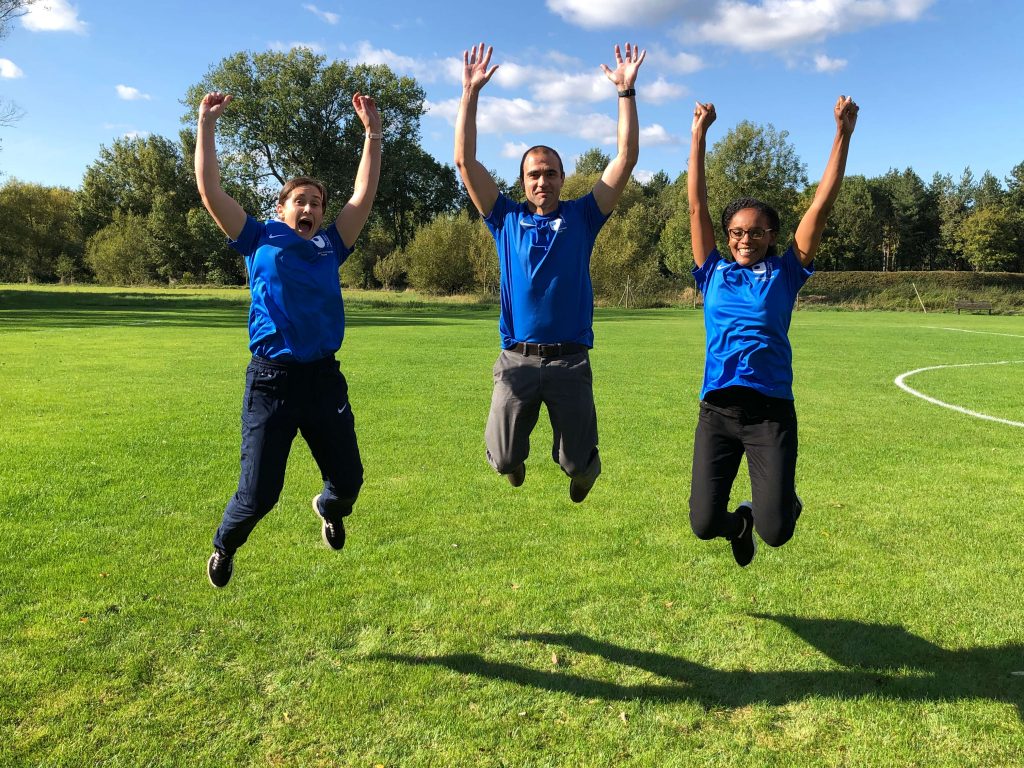 We are delighted to announce that in association with Kitlocker we now have a range of Open University Sport and Fitness branded Nike kit and accessories available for staff and students. This can be purchased through the website below.
We are delighted to announce that in association with Kitlocker we now have a range of Open University Sport and Fitness branded Nike kit and accessories available for staff and students. This can be purchased through the website below.
We have introduced this kit to help our staff and student feel part of #TeamOUsport and develop our team identity. Open University Sport and Fitness Lecturer Dr Nichola Kentzer, who came up with the idea to develop this kit said:
“It’s important for students to have a strong sense of belonging to their university. The OU is such an amazing place and we want our students to really feel part of the Sport and Fitness team. Face to face universities encourage this sense of identity by having team kit, so why can’t we have this for our students too? Just because our students are geographically spread it doesn’t mean they can’t wear their OU kit with pride, showing others that they are part of the 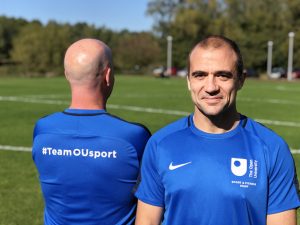 OU Sport and Fitness team. I can’t wait to see students sharing pictures of themselves working, training, studying and competing in their kit!”
OU Sport and Fitness team. I can’t wait to see students sharing pictures of themselves working, training, studying and competing in their kit!”
We would love to see pictures of you wearing your #TeamOUsport kit in a variety of locations so please share them with us on Twitter (@OU_Sport) using the hashtag #TeamOUsport